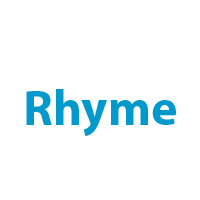What is Rhyme?
Rhyme is the repetition of the same unit of sound in a poem, usually at the ends of the lines. Very often people think of poetry as something that rhymes. Poetry with no rhyme, but with a meter is called blank verse, whilst poetry that rhymes (or can rhyme) but which has no meter is called free verse. Rhyme is an obvious feature of poetry.

Rhyme is pleasing to the ear, or can be, and adds the musical sound quality in poetry that can be so important to it. It can emphasize certain words, as words which rhyme are obviously more prominent than those which do not. It can unify a poem and draw it together, or give a ritualistic, almost mystic element to it. The system of rhyme within a poem is called ‘rhyme scheme’. This is ascertained by giving each rhyming sound at the end of a line a letter of the alphabet and repeating this letter when the sound is repeated. For instance, in “O young Lochinvar has come out of the west, Throughout the wide Border his steed was the best,” the first line rhymes with the second, so that the rhyme scheme of arrangement of the repeated sounds of the first two lines of the poem can be described as “aa”. Thus, if we have a rhyme scheme like “ababcdecde”, it is understood that the first and the third lines rhyme with each other, the second and fourth with each other and that the fifth and eighth, the sixth and ninth, and seven and tenth lines rhyme with each other.
1. Regular Rhyme: -
(a) day, night (b)
(a) may, bright (b)
2. Blank verse: - There is no strict rhyme scheme, but it should be always in iambic pentameter.
3. Free verse: - There is neither strict meter nor rhyme.
Finally, rhyme is an important element of music in poetry. Rhyme is the similarity of sounds at the end of lines. In a proper rhyme, every sound after last stressed vowel must be the same. (Eg. see/tree, aspire/perspire, etc.). Rhyme can also be used to support meaning. Rhyme not only creates harmonious effects, but when it is improper, imperfect or deceptive (cheating), it can create ironic effects.
Published on 24 Jan. 2014 by Kedar Nath Sharma
Related Topics
 |
bachelorandmaster.com |